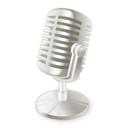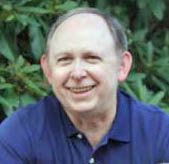Oregon Poetic Voices
 In a world that really
In a world that really
doesn't seem to value
the small, quiet voice,
I think they felt like
they mattered
says Doug Erickson, as he finishes a day recording people and poems in rural Oregon.
Oregon Poetic Voices, founded by Erickson in 2009, is the nation’s largest online poetry repository, offering a comprehensive digital archive of poetry readings from all over the state.
OPV contains recordings of almost every significant Oregon poet — including a 1921 recording of Oregon’s first poet laureate — and over 300 contemporary poets of all ages, backgrounds and accomplishment. Access to the wesbite is free, and participation is open to all.
“We hope to be as inclusive as possible,” he says. “Early on I thought it was important that this not to be a juried project. I felt that to really capture the essence of Oregon and its poets, it was important to leave it completely open to all. It gives the site a mixture of literary, cultural, and anthropological layers.”
Though not a poet, Erickson — who works as special collections archivist at Lewis & Clark College in Portland, Oregon — carries an enthusiasm for the written and spoken word. As a result, OPV is growing fast. He travels town to town, across the state, inviting new, established, and self-described poets to share their words.
“I have had people come on horseback and on bus, from homeless people to the wealthiest of our state,” he says. “Each with a story, and a medium to share their thoughts, ideas, and creativity.”
 Doug Erickson, Oregon Poetic VoicesYou are not a poet, yet you appreciate poetry, and think it worthy to archive. Why did you create Oregon Poetic Voices?
Doug Erickson, Oregon Poetic VoicesYou are not a poet, yet you appreciate poetry, and think it worthy to archive. Why did you create Oregon Poetic Voices?
I do not self identify as a poet, but I am a writer, and know the highs and low of trying to communicate through printed words. Early on I thought it was important for me to not be a poet, and for this not to be a juried project. Much of the academic world that I live in is peer reviewed and scholarly. While I am a big believer in this type of scholarship, I felt that to really capture the essence of Oregon and its poets, it was important to leave it completely open to all. This has enabled the site to grow much faster that it would have been if every poem and poet was vetted. It also gives the site a mixture of literary, cultural, and anthropological layer to it. I imagine that not only those interested in poetry, but also anthropology, sociology, history and literature, in the future will find this site useful. I hope it becomes a time capsule for the thoughts and ideas of many Oregonians from this time period.
When and how did you start OPV?
The idea comes out of the encouragement of William Stafford, who was my colleague and friend at Lewis & Clark, who wrote and encouraged writing every day. When his archives came to the college, and I saw the nearly 50,000 pages of correspondence, I realized that much of these letters were from fellow writers, those that were famous, and those that were just simply trying to write, or become writers.
His teaching philosophy was "no praise, no blame," meaning encourage people to continue to pursue and grow as writers and thinkers. Sometimes praise and blame can lead one down a path that takes away from that seeking. While I don't fully subscribe to that notion myself, I do think in the case of OPV, this approach is a good one. Sure, there are many bad poems, yet there are also some very good, if not great, ones. They all represent a place in time for a writer/poet. Some with bad poems will go on and write great ones, and vice/versa. So, I wanted to capture and create a medium where this could take place.
Oft times historians and archivists wait for the history to come to them, rather than go out and harvest the activity that is happening presently. History is full of examples of recording that survived over time, the ruling class, and the prevailing race. With technology, and hopefully more cultural compassion, we can harvest the history of people, regions, races, genders, and voices, hereto forgotten or destroyed. And we can do it in the season that it is being created. I hope this is what OPV is doing.
What do you hope listeners will experience?
I hope they encounter the breadth, and expanse of this collection. There are so many self-identified poets that really feel passionate about their writing, and words. I have had people come on horseback and by bus, from homeless people to the wealthiest of our state. Each with a story, and a medium, to share their thoughts, ideas, and creativity. I think that Oregon is unique in having so many poets, but I also think that if other states were to try this same project (and I hope they do!) they would find that many people would come forward to share their writings.
Here's an excerpt of an email I received. I share it with you because I think it captures the feelings that many have when they come together and are able to share their work. I just happen to be the person who brings the equipment. The real OPV is simply the poets, young old, good, bad, famous, and not famous. Each share equal footing here, and collectively make up the voice of Oregon:
. . . I'm the woman who was so emotional I insisted on hugging you and thanking you for letting our voices be heard. What you may not know but should, is that when my friends came out of the recording room their faces showed the joy of accomplishment. We sat around the table and our poetry tribe found a reason to be a community together because a community happens sometimes when you don't know it will and reading our work brought us together. Reticent, shy people bubbled over with talk. People who I'd had to nag and keep after dared to come and do something they truly feared but wanted to do so much and, because of you, they just did it. . . . In such a complex, difficult, unknowable place as this earth, this life, I love when something is so clearly GOOD, and Oregon Poetic Voices simply is.
How is OPV funded?
OPV started with an initial grant from the Library Service and Technology Act, a grant distributed to all 50 states and administered by the State Library. The money originates with the Institute of Museum and Library Services.
We only have funding through January 31, 2012. After that, well . . . we are working on it. We are not really in a position to take donations, unless some angel wants to come in and be a major funder. We are looking to small granting agencies to see if we can keep some of this program going after Feb. 2011. I am Head of Special Collections and Archives here at LC for the last 20+ years, so I will continue in that role, and hope to keep OPV alive in some small way if no money comes our way.
Bonus Question: Anything I didn't ask that you'd like to answer?
None of this would be possible without the hard work and dedication of my team at Lewis & Clark College: Melissa Dalton, poetry project fellow; past poetry project fellow, Tessa Idlewine; Jeremy Skinner and Paul Merchant, my colleagues in Special Collections and Archives; OPV's design team Jeremy McWilliams and Annelise Dehner, and student interns and assistants past and present, Rachel Sims, Chris Keady, Natalie Figuroa, Anna Fredrickson, Caitlin McCarthy, and Becca Dierschow; workshop leaders, and all the local folks in communities across Oregon who helped to organize and prepare for OPV, and for making us feel at home in your communities.
To learn more, and listen, to Oregon Poetic Voices, visit www.oregonpoeticvoices.org.
 Drew |
Drew |  Post a Comment |
Post a Comment | 






